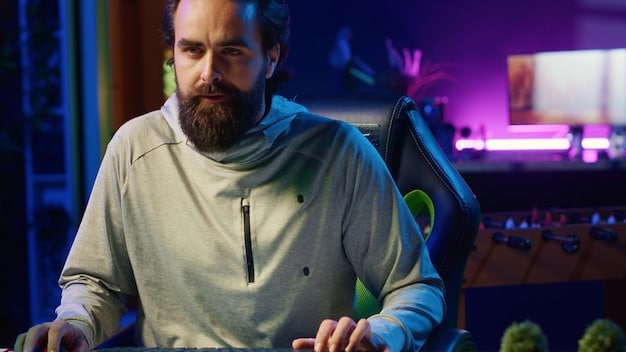Get Sponsored as an Esports Player in the US: A Guide

Becoming a sponsored esports player in the US requires a blend of exceptional skill, strategic personal brand building, active community engagement, and consistent competitive performance. Securing sponsorships is not merely about gaming prowess, but about demonstrating tangible value to potential brands through a professional approach and a compelling unique selling proposition.
In the fiercely competitive landscape of professional gaming, ascending to the elite ranks often hinges on more than just raw talent. To truly thrive and sustain a career, understanding how to get sponsored as an esports player in the US: A Practical Guide is paramount. This objective is a complex journey, demanding dedication, strategic planning, and a deep understanding of the esports ecosystem.
The Foundation: Building Your Esports Player Profile
Before even thinking about sponsorships, a player must establish a robust and compelling profile. This involves more than just logging hours in-game; it’s about crafting an identity that resonates within the esports community and attracts potential brand partners. Your profile is your resume, your portfolio, and your brand all rolled into one.
Developing deep expertise in your chosen game is non-negotiable. This means not just playing, but understanding game mechanics at a microscopic level, studying professional meta, and consistently analyzing your own gameplay for improvement. Mastery is the bedrock upon which all other aspects of your profile are built.
Mastering Your Game and Role
True mastery goes beyond individual skill. It encompasses a profound understanding of team dynamics, strategic decision-making, and adapting to ever-evolving game patches. Sponsors look for players who are not just good, but exceptional, consistent, and capable of leading or performing under pressure.
- Intensive practice: Dedicate substantial time to in-game practice, focusing on mechanics, map awareness, and decision-making.
- VOD review: Analyze your own gameplay recordings and professional matches to identify strengths, weaknesses, and strategic opportunities.
- Game knowledge: Stay updated on patch notes, meta shifts, and community discussions to maintain a competitive edge.
Your in-game performance statistics are a critical metric. High K/D ratios, win rates, and other game-specific metrics paint a quantitative picture of your skill. However, don’t just chase numbers; strive for impactful play that genuinely contributes to your team’s success.
Brand Building: Crafting Your Online Presence
In the digital age, your online presence is your storefront. Professionalism, consistency, and authenticity are key. Brands want to associate with players who represent positive values and can effectively engage an audience.
Establish a consistent brand identity across all platforms. This includes your gamertag, profile pictures, social media handles, and overall tone. Professionalism doesn’t mean being stiff; it means being respectful, engaging, and presenting yourself in a way that reflects well on potential sponsors.
Engaging with your audience on platforms like Twitch, YouTube, and Discord is crucial. Respond to comments, participate in discussions, and create a community around your content. A strong, interactive community demonstrates your influence and reach.
Maintain an active presence on social media platforms relevant to esports, such as Twitter, Instagram, and even TikTok. Share insights, engage with other players and personalities, and showcase your personality. This helps build a connection with your audience beyond just your gameplay.Consistency in content creation, whether it’s streaming, uploading videos, or just posting updates, keeps your audience engaged and your brand visible. Sporadic activity can lead to a decline in viewership and interest.
This foundational stage is where players solidify their identity, showcase their skills, and begin to cultivate the audience that will eventually become valuable to sponsors. Without a strong personal brand and a demonstrable level of skill, the pursuit of sponsorship becomes a much steeper uphill battle.
Showcasing Your Value: Performance and Community Engagement
Once a strong personal profile is established, the next crucial step is to actively demonstrate your value to potential sponsors. This involves consistent high-level performance in competitive settings and robust engagement with your growing community. Brands are looking for a return on investment, and your ability to perform and influence is that return.
Competitive participation is non-negotiable. Regularly competing in tournaments, whether online or LAN, proves your skill under pressure and provides concrete data points for sponsors to evaluate. Winning, or consistently placing high, builds your reputation and visibility.
Competing and Excelling in Tournaments
Success in tournaments isn’t just about winning; it’s about the journey. How you handle losses, communicate with your team, and adapt to different competitive environments all reflect on your professionalism. Sponsors want resilient and adaptable players.
- Tiered competition: Start with smaller, local tournaments and gradually work your way up to larger, more prestigious events.
- Team play: If applicable to your game, be a valuable team member, demonstrating excellent communication and synergy.
- Consistent performance: Aim for consistent top finishes rather than sporadic wins, showcasing reliability.
Documenting your competitive journey through highlights, VODs, and social media updates provides tangible proof of your achievements and dedication. This content can be repurposed for pitches to sponsors.
Your performance in competitive settings serves as a powerful testament to your skill and potential. It’s where your hours of practice translate into concrete results, making you a more attractive prospect for sponsorship.
Growing and Engaging Your Audience
A large, engaged audience is often as valuable as, if not more valuable than, raw skill. Sponsors are interested in reaching your demographic. The bigger and more dedicated your audience, the more attractive you become as a marketing channel.
Authenticity fosters genuine engagement. Be yourself, share your passion, and interact honestly with your followers. People are more likely to support a player they feel a connection with.
Leverage various platforms to reach different segments of your audience. Some might prefer Twitch streams, others YouTube videos, while some may only follow you on Twitter. Diversifying your content distribution maximizes your reach.
Interaction is key to building a strong community. Respond to comments, host Q&As, and give shout-outs to active supporters. Make your audience feel valued and part of your journey, which in turn strengthens their loyalty and increases their willingness to support sponsors you endorse. This consistent engagement creates a feedback loop, helping you understand your audience better and tailor your content and interactions accordingly.

Demonstrating value through both competitive prowess and strong community engagement is the bridge between being a talented player and becoming a sponsored esports athlete. It shows brands that you can not only perform but also effectively represent their products or services to a receptive audience.
Strategic Outreach: Approaching Potential Sponsors
With a strong foundation of skill, a compelling personal brand, and a demonstrable track record of performance and audience engagement, the next critical step is to strategically approach potential sponsors. This phase requires meticulous preparation, professionalism, and a targeted methodology.
Before any outreach, conduct thorough research. Identify companies that align with your personal brand, target demographic, and values. A genuine connection between you and the brand is essential for a successful, long-term partnership rather than a short-term transaction. Look beyond traditional gaming companies; consider energy drinks, snack brands, apparel, and technology companies.
Crafting Your Sponsorship Package
A sponsorship package is your formal proposal, outlining who you are, what you offer, and what you’re seeking. It should be concise, professional, and visually appealing. Think of it as a business plan for your esports career.
Your package should clearly articulate the value you bring to a sponsor. Highlight your statistics, audience demographics, growth trends, and engagement rates. Quantify your reach and influence whenever possible; numbers speak louder than words.
- Player bio: A brief, compelling summary of your esports journey, achievements, and unique selling points.
- Audience demographics: Data on your viewership, followers, and their interests.
- Engagement metrics: Average views, watch time, comment rates, and social media interactions.
- Sponsorship tiers/offers: Outline different levels of partnership with clear deliverables for each.
Consider offering various sponsorship tiers, from product-only deals to monetary compensation, allowing sponsors flexibility. Be clear about what you expect in return, whether it’s equipment, financial support, or promotional opportunities.
A well-structured sponsorship package demonstrates your professionalism and foresight, showing potential partners that you are serious about your career and understand the business side of esports.
Identifying and Contacting Brands
Target your outreach. Sending generic emails to hundreds of companies is unlikely to yield results. Instead, focus on a smaller number of brands that are a genuine fit.
When sending initial contact, keep your message brief and to the point. Introduce yourself, state why you believe you’d be a good fit, and attach your sponsorship package. Personalize each email to show you’ve done your homework.
Look for sponsorship or marketing contacts within the companies. LinkedIn can be a valuable tool for finding relevant individuals. Directly approaching the right person can significantly increase your chances of getting a response.
Be prepared for rejection. Not every company will be interested, and that’s okay. Learn from each interaction, refine your approach, and continue to pursue opportunities. Persistence is a key trait in the sponsorship hunt.
Strategic outreach is an art form. It requires patience, meticulous planning, and a proactive attitude. By presenting a professional, value-driven proposal to the right companies, you significantly increase your chances of securing the sponsorship that can propel your esports career forward.
Negotiation and Partnership: Sealing the Deal
Successfully securing a sponsorship requires more than just getting a foot in the door; it involves careful negotiation and the establishment of a mutually beneficial partnership. This stage transforms a potential interest into a concrete agreement, laying the groundwork for a lasting relationship.
Before entering any negotiation, clearly define your non-negotiables and ideal terms. Understand the market value for players at your level, considering factors like audience size, competitive achievements, and brand fit. Knowing your worth empowers you to negotiate effectively.
Understanding Contractual Terms
Sponsorship agreements are legal documents, and understanding every clause is crucial. Don’t hesitate to seek legal counsel if certain terms are unclear or seem unfavorable. A well-understood contract protects both parties.
Pay close attention to the duration of the contract, payment terms (if any), deliverables expected from you, exclusivity clauses, and termination conditions. Ensure that the expectations are realistic and that you can genuinely fulfill your obligations without compromising your integrity or mental health. An exclusive agreement means you cannot promote competitor products, which limits other potential income streams.
- Deliverables: Be clear on performance metrics, content creation requirements (streams, social posts), and appearance obligations.
- Exclusivity: Understand if you can work with other brands, especially competitors.
- Payment/Compensation: Clarify payment schedules, product provision, and performance-based incentives.
Also, consider intellectual property rights. Ensure you retain ownership of your content and brand, or that any shared rights are clearly defined and fair. The aim is to create a partnership that provides stability while allowing for future growth.
Ambiguity in a contract can lead to disputes down the line. Take the time to clarify every point, ensuring mutual understanding and agreement before signing.
Building a Mutually Beneficial Relationship
A sponsorship is not a one-time transaction; it’s a partnership. Your ability to deliver on your promises and consistently provide value will determine the longevity and success of the relationship. Brands invest in players they trust can represent them well.
Go above and beyond your contractual obligations. If you commit to 10 social media posts, consider doing 12. Enthusiastically promote the sponsor’s products during streams and engage their audience. Proactive communication about your content plans and performance updates keeps the sponsor informed and confident in their investment.
Provide regular feedback to your sponsor on product performance or audience reception. This demonstrates your commitment to their success and positions you as a valuable partner, not just a contractual obligation.
Maintain open lines of communication. Timely responses to emails, proactive updates, and constructive feedback foster a positive working relationship. A strong relationship can lead to contract renewals, increased compensation, and even referrals to other brands.Think long-term. A successful initial sponsorship can be a stepping stone to larger deals and more impactful partnerships in the future. By consistently delivering value and fostering a positive relationship, you solidify your reputation as a reliable and professional esports talent.
Sustaining Your Sponsorships: The Long Game
Securing a sponsorship is a significant achievement, but retaining it and building on it for long-term career stability is where the true challenge lies. Sustaining sponsorships involves consistent effort, adaptability, and unwavering professionalism. It’s about demonstrating repeated value and proving you are a worthwhile investment over time.
The esports landscape is constantly evolving. Games rise and fall in popularity, audiences shift, and new technologies emerge. Staying relevant means continuously adapting your skills, content, and personal brand to keep pace with these changes. Stagnation is the quickest route to losing a sponsor’s interest.
Delivering Consistent Value
Your primary responsibility to a sponsor is to consistently deliver on the agreed-upon terms, and ideally, exceed them. This involves maintaining your competitive performance, producing engaging content, and actively promoting their brand.
Regularly track your performance metrics, both in-game and on your content platforms. Provide periodic reports to your sponsors, highlighting key achievements, audience growth, and engagement rates related to their brand. Transparency builds trust.
- Content quality: Ensure your streams, videos, and social media posts are high quality and align with your brand image.
- Brand integration: Seamlessly incorporate sponsor products into your content in an authentic way that resonates with your audience.
- Timely reporting: Provide sponsors with data and insights on the effectiveness of your promotion.
Actively participate in sponsor events, whether it’s an online campaign or a live appearance. Being a reliable and enthusiastic representative strengthens the partnership and opens doors for future collaborations.
Consistently delivering value, even when it’s not explicitly stipulated in the contract, positions you as a proactive and dedicated partner, making it an easy decision for sponsors to renew their agreement.
Adapting to the Esports Landscape
Esports is a dynamic industry. What’s popular today might be niche tomorrow. To maintain your relevance and attractiveness to sponsors, you must be willing to adapt and evolve your career path.
This might involve exploring new games, diversifying your content types, or even shifting your focus from pure competition to content creation if that aligns better with market trends and your personal brand. Flexibility is a virtue in this fast-paced environment.
Stay networked within the industry. Attend esports events, connect with other players, content creators, and industry professionals. These connections can provide valuable insights, collaboration opportunities, and keep you abreast of emerging trends.
Seek feedback from your audience and sponsors. Understanding their needs and preferences can guide your evolution and help you tailor your content and brand to maintain maximum appeal. This iterative process of feedback and adaptation is crucial for long-term success.Sustaining sponsorships is about proving that your value proposition is not just a snapshot in time, but a continuous and growing asset. By consistently performing, engaging, and adapting, you can ensure a stable and prosperous career in the ever-evolving world of esports.
Common Pitfalls to Avoid in the Sponsorship Hunt
While the path to securing esports sponsorships can be rewarding, it’s also fraught with potential missteps that can derail even the most promising careers. Being aware of these common pitfalls and actively working to avoid them is as crucial as understanding the steps to success. Avoiding these errors often comes down to maintaining professionalism, realistic expectations, and ethical conduct.
One prevalent mistake is having an inflated sense of self-importance or an unrealistic expectation of what a sponsorship entails. Brands, large or small, are looking for a return on their investment. If you expect a massive cash injection simply for existing as a player, you’re likely to be disappointed. Sponsorships are partnerships, rooted in mutually beneficial exchange, not charity.
Lack of Professionalism and Consistency
Professionalism extends beyond just competitive play; it encompasses your entire online and offline persona. Sponsors are acutely aware that you will represent their brand, and any unprofessional behavior reflects negatively on them. This includes your communication, content, and interactions.
Inconsistent effort in competition or content creation is a major red flag. If your performance dips, or your streaming schedule becomes erratic, sponsors will see you as a less reliable investment. They look for players who demonstrate sustained commitment and a strong work ethic.
- Poor communication: Not responding promptly to inquiries or lacking clarity in discussions with potential sponsors.
- Toxic behavior: Engaging in hateful speech, excessive negativity, or poor sportsmanship online or in-game.
- Inconsistent content: Irregular streaming, infrequent video uploads, or a sudden drop in content quality.
Your online conduct is under scrutiny. Any past controversies, inflammatory remarks, or instances of poor behavior can resurface and deter potential partners. Cultivating a positive public image from the outset is essential. A single lapse in judgment can have long-lasting repercussions on your sponsorship prospects.
Maintaining a high standard of professionalism and consistency demonstrates that you are a serious, reliable talent worthy of investment.
Ignoring Brand Alignment and Value Proposition
Many aspiring players make the mistake of blindly reaching out to any company, regardless of brand fit. A mismatch in values or target audience makes a sponsorship highly improbable and, if signed, unlikely to be fruitful for either party.
Forgetting that a sponsorship is a business transaction is another common pitfall. You must articulate the tangible value you bring to a brand. If you cannot clearly explain how partnering with you will benefit them – whether through exposure, sales, or brand image – your pitch will fall flat.
Avoid focusing solely on what you want from a sponsor. While financial support or equipment is beneficial, your pitch should prioritize what you can offer them. This shifts the dynamic from a request to a proposition.
Not tailoring your pitch to each specific brand is a critical error. A generic proposal signals a lack of genuine interest and effort. Show that you’ve researched their company, understand their goals, and know how you can authentically contribute to them. This personalized approach speaks volumes about your dedication and potential as a partner, significantly increasing the likelihood of a positive response.
Navigating the complex world of esports sponsorships demands not only skill and dedication but also a keen awareness of these potential pitfalls. By upholding professionalism, consistency, and a strong understanding of mutual value, players can significantly increase their chances of securing and maintaining beneficial partnerships, paving the way for a successful career in competitive gaming.
The Future of Esports Sponsorships: Trends and Opportunities
The landscape of esports sponsorships is dynamic, constantly evolving with technological advancements, shifting consumer behaviors, and the professionalization of the industry. Understanding these trends is crucial for any aspiring esports player looking to secure and sustain partnerships in the coming years. Staying ahead means not just adapting, but proactively positioning yourself for emerging opportunities.
One significant trend is the increasing diversification of sponsors. Beyond traditional gaming peripherals and energy drinks, mainstream brands from various sectors—like automotive, fashion, and financial services—are recognizing the massive reach and engagement of the esports audience. This broadens the field of potential partners for players with diverse personal brands.
Micro-Sponsorships and Creator Economy
While large, multi-year deals with major organizations remain aspirational, the rise of the “creator economy” has opened doors for micro-sponsorships and direct fan monetization. Platforms like Patreon, Twitch subscriptions, and direct community support allow players to build sustainable income streams even without a major brand backing.
This trend empowers individual players, giving them more autonomy and reducing their sole reliance on traditional teams or large corporations for revenue. It fosters a more entrepreneurial spirit within the esports community, where players are essentially building their own businesses.
- Affiliate marketing: Promoting products with unique codes or links for a commission on sales.
- Brand ambassador programs: Longer-term, non-exclusive partnerships with smaller companies for consistent promotion.
- Fan subscriptions and donations: Direct financial support from dedicated community members on platforms like Twitch.
For aspiring players, this means building a strong, loyal community can directly translate into income, making them attractive even to smaller brands that value niche influence over mass appeal. These smaller deals can also serve as stepping stones to larger sponsorships later on.
The ability to cultivate and monetize a dedicated following is becoming an increasingly valuable asset for any esports professional, regardless of their competitive tier.
Esports and Emerging Technologies
New technologies are continuously shaping the sponsorship landscape. Virtual reality, augmented reality, and especially Web3 technologies like NFTs and blockchain are creating novel ways for brands to engage with esports fans and for players to monetize their influence.
Consider the potential of NFTs for exclusive fan engagement,
digital collectibles, or even fractional ownership of player brands.
While still nascent, understanding these integrations could provide a
unique value proposition to forward-thinking sponsors.
The convergence of esports with interactive media and immersive
technologies presents new opportunities for brand activations and
unique content experiences. Players who can leverage these platforms
will stand out. For example, interactive streaming experiences or VR-enhanced
broadcasts could create more immersive sponsorship placements.
Staying informed about these technological shifts isn’t just about
being trendy; it’s about identifying new avenues for revenue and
brand partnerships. Players who are early adopters and innovators in
these spaces will be highly sought after by brands looking to lead
their respective markets in digital engagement. This proactive engagement makes a player more enticing to brands looking for innovative ways to reach audiences.
The future of esports sponsorships promises greater diversity, more direct avenues for monetization, and exciting technological integrations. By understanding and embracing these trends, aspiring esports players can strategically position themselves not just for today’s opportunities, but for a thriving career in the evolving landscape of professional gaming.
| Key Aspect | Brief Description |
|---|---|
| 🎮 Skill Mastery | Exceptional in-game mechanical skill and strategic understanding. |
| 📣 Personal Brand | Professional, consistent, and authentic online presence across all platforms. |
| 🤝 Community Engagement | Active interaction and growth of a loyal, engaged audience. |
| 📈 Value Proposition | Clearly articulating the benefits a sponsor gains from partnership. |
Frequently Asked Questions About Esports Sponsorships
▼
Competitive ranking is highly important, especially for sponsorships focused on performance-based advertising. High rankings demonstrate skill, dedication, and the ability to perform under pressure, which are appealing attributes for brands looking to associate with excellence and competitive spirit.
▼
While a large following helps, it’s not strictly necessary. Quality over quantity often applies; a smaller, highly engaged audience can be more valuable than a massive, disengaged one. Sponsors also look at your brand alignment, content quality, and professionalism, not just follower count.
▼
Initially, gaming peripheral companies and energy drinks dominated, but the market has diversified. Now, you’ll find tech companies, apparel brands, automotive manufacturers, financial institutions, and even food and beverage companies sponsoring players. Look for brands that align with your demographic.
▼
Accepting product-only sponsorships can be a good starting point, especially if the products are essential to your gaming setup or enhance your content. They can provide valuable equipment without upfront cost and serve as a stepping stone to more comprehensive deals, building your portfolio as a brand ambassador.
▼
The timeline varies widely based on your profile, game, and the market. It can take anywhere from a few months to over a year of consistent effort. Building a strong brand and audience is a marathon, not a sprint, and securing a meaningful sponsorship reflects this long-term investment.
Conclusion
Securing a sponsorship as an esports player in the US is a multifaceted endeavor that transcends mere gaming prowess. It requires a strategic convergence of exceptional in-game skill, the cultivation of a compelling and authentic personal brand, consistent high-level performance in competitive arenas, and a proactive approach to community engagement. The journey demands relentless dedication to self-improvement, a keen understanding of brand alignment, and the business acumen to effectively communicate your value proposition to potential partners. By meticulously building your profile, demonstrating tangible worth, conducting targeted outreach, negotiating thoughtfully, and consistently delivering on your promises, you can transform your passion for esports into a sustainable and rewarding career, navigating the evolving landscape of professional gaming with confidence and strategic foresight.





